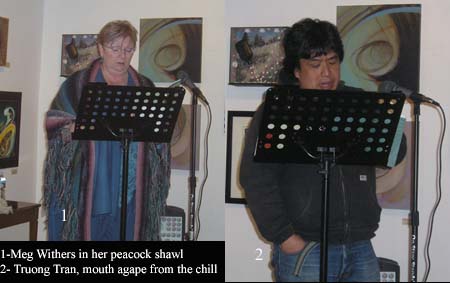Truong Tran and Meg Withers entered the frigid domain of SPC at HQ for the arts. The occasion was not for the weak of spirit. Those who were bled and refilled with anti-freeze fared the best. However, the numbing sensation in the extremities likely was the effect of Truong’s and Meg’s fine poems.
Special guest star Tom Goff started the evening off with a few poems, commenting that it was “two or three quick ones, then off to brag with the boys.” He read “Blue Minute” which will make an appearance in theSacramento News and Review in the next week or so. Then he read a poem that was inspired by the cemetery movement in Latvia entitled, “My Nora, My Latvia.”
Then Truong took the stage and commented that this was the closest he had ever come to giving a reading in a meat locker; then he read initially from placing the accents.
He read “The mistress” about a man whose fiancée cleaves her finger with the ring still on it, saying that she would have never committed to a man who was already taken, whose mistress was the war.
Because many of Truong’s poems are untitled as he tries to build the continuity of space and voice from page to page, Several of the poems he read are referred to by the first line. Such was the case with “Fated, I was born of 3 brothers,” a piece that at the end becomes something of an identity statement with it’s litany of “It is I. It is I. It is I” at the tend.
Truong then turned to reading from dust and conscience which was very similar to his book of perceptions except that some of the characters in book of perceptions came back to challenge the speaker after Truong’s experience visiting Vietnam left him feeling a bit adrift, a bit of a voyeur of a culture he had previously felt a strong attachment to.
The first poem he read was “If Only I were a Dissident Poet” which acknowledged the difficulty of taking such a path.
“I’ve located you as a letter of the alphabet” that focuses on a relationship between “K and T [who] fell in love in country V.”
From the book of instructions within dust and conscience, he read a lovely piece for his mother “her hair remains a licorice black.” Then as the speaker reflects on his mother, he regards that black of her hair as “black as a color as absolute.”
From the book of ruptures in dust and conscience he read poems that he suggested were “anti-poems.” These were poems that saw the interruption of several figures, such as a ghost, a scorpion, and a sand crab, who would challenge the speaker.
Truong read a poem in which he encounters three friends Carlito, Anna and Bartholomew, who are all asked nonsensical questions: If you could live in what period? what time? What would it be? The speaker retorts that the answer they give would be used for the next round of nonsensical questions.
Truong then read a poem in the voice incapable of telling stories. In the end, the voice says “I love you,” hearing it, though, as “I love.”
Finally, Truong ended with a poem where the speaker’s page of writing was devoid of punctuation. They resembled nomadic monks. It ended with a period and the page was left blank.
Meg Withers donned a peacock shawl and started her reading off with a poem about the mythical story which arced over into her next poem which was “the real story” behind Persephone. In this the relationship between Persephone and Pluto resembled that of the modern suburbanite. Pluto spends too much time on the Internet. The mother exhorts Pluto to marry the poor girl so that her daughter could at least become the queen of futility.
Nest she read a senryu: one’s supper and one’s freedom always come to blows
She read a poem about cats which she credited as always teaching her something about Buddhism. The poem bumps into the furniture. She becomes tired of yet another new idea. She hurts. Then the gray cat stretches and flows from the room.
Somewhat the title of her new book on Ghost Road Press, she read “What I Know: Must Be Present To Win” about death’s forgetting to let us out of our commitment.
In “Visiting the Dead, New Year’s Day, 1965” the speaker begins the poem on the highway at mile marker 331. Then, going 75 MPH past range cattle, some sort of calamitous event is suggested. The memory of this moment is recalled and attached to a lover.
In “What We Have Left” more memories of accidents appear. The speaker reflects on her youth and recognizes that Leonard Cohen was not going to walk into a bar and discover her. The speaker sees Julia Vinograd at Shakespeare’s Books. Vinograd is selling poems for fifty cents a page.. The speaker becomes ashamed of herself and writes the kind of poetry that when you wake up at noon the next day, you hate it.
The last poem Withers read from her new book on Ghost Road Press entitled Must Be Present To Win was “Trajectory,” a heart-wrenching love poem dedicated to Rich. In it the speaker starts out by saying, “You say you love fire, here I am burning.”
Withers capped off the evening with a poem dedicated to Stanley Kunitz entitled Stanley Kunitz does the 100s. It was inspired by an interview she heard done with Kunitz when he turned 100, a year before he died.
The next new poem she read that also sported an epigraph from Carol Frith [“memory will edit this”]
Finally, she read from a longer poem entitled “Untitled Numinous.” The poem looks at suffering and the “stunning wreckage” of a life.
The brave souls who came to brave the penetrating cold in the room then went on to brave the chill of the night.





